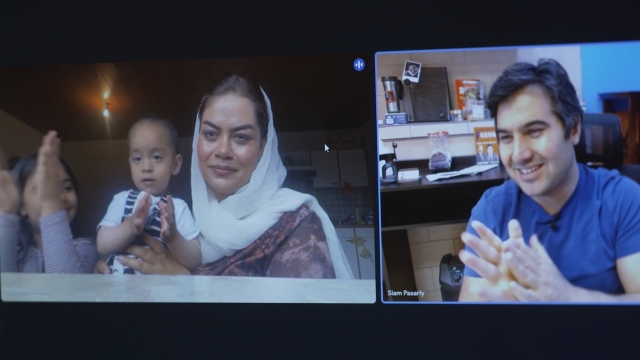Afghan refugee Siam Pasarly finds life in America bittersweet. In Chicago, he owns an employment business and feels protected from Taliban reprisals.
Still, despite risking his life to support the U.S. mission in Afghanistan, he now feels that America has turned its back on him and his family. He hasn't seen his wife and two young children for more than two years and says their separation feels like "mental torture" for all of them.
Like most evacuees, Pasarly resettled in the U.S. under a temporary status called humanitarian parole. It protects him from deportation and allows him to work — but it doesn't offer him a path to permanent status, making it impossible, for now, to sponsor his relatives.
Once a spokesperson for the U.S.-backed Afghan chamber of commerce, he says he was a prime target of the Taliban — and lost many colleagues.
"I was afraid of my shadow. I couldn't trust anybody," recalls Pasarly, adding that the Taliban killed many of his friends by placing bombs under their cars.
SEE MORE: Questions remain 2 years after US withdrawal from Afghanistan
In the chaotic days following the fall of Kabul two years ago, it took Pasarly five days to weave through the crowd and reach the airport.
Alongside thousands of fellow Afghan allies, he was eventually airlifted to U.S. bases in Bahrain and then Wisconsin before resettling in Chicago and opening his staffing business, where he aims to connect employers with fellow refugees.
A few blocks away, also in Chicago, lies the Muslim Women Resource Center, which supports hundreds of Afghan refugees with job training and asylum cases.
Like Pasarly, many of them are separated from loved ones. "They want to know when their husbands are coming," explained Sima Quraishi, the center's executive director, "or when their children that are 4- or 5-years-old that are left alone in Afghanistan are coming."
Quraishi says that out of the roughly 2,000 evacuees her center supports, not even 20 have gotten green cards. She urges Congress to pass the Afghan Adjustment Act to legalize those in limbo.
"That is the most important thing for the Afghan community, because they really want to have a piece of mind," she said.
In a statement marking the two-year anniversary of the U.S. pullout, Secretary of Homeland Security Alejandro Mayorkas said that the Biden administration remains "committed to ensuring the safety, security, and well-being of the Afghan newcomers" and that "our allies deserve certainty and stability, which only Congress can guarantee through legislation."
As for Pasarly, he at least arranged for his wife and kids to move to Germany.
But he has extended family still stranded in Afghanistan — and feels guilty being so far away.
"I cannot see my country in this condition. That hurt me. That is painful. I couldn't say goodbye to my father, to my mother," he said.
Trending stories at Scrippsnews.com



